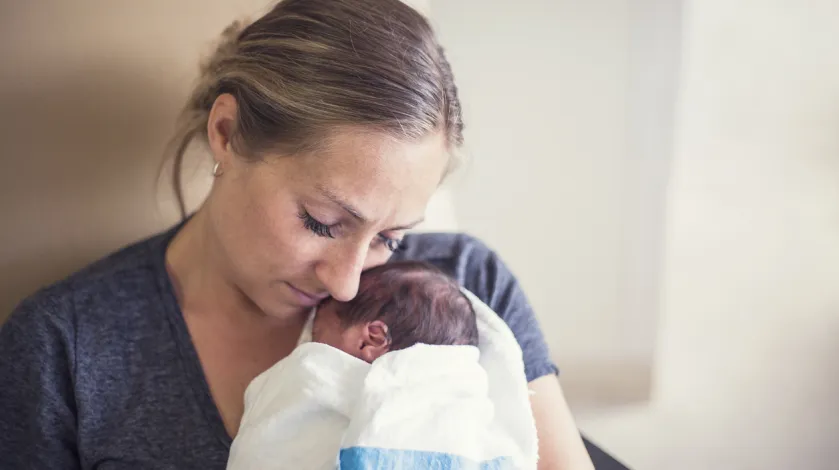What Parents Should Know about RSV
Author

South Shore Health
Fall and winter are busy times for pediatric caregivers, whether at South Shore Medical Center or South Shore Hospital.
A large portion of sick visits or hospital admissions during this time of year are due to respiratory illnesses, such as pneumonia, asthma and bronchiolitis. Bronchiolitis is an infection of the lungs that causes inflammation and swelling in the small airways of young children.
There are many viruses that cause bronchiolitis, but the most common we see is Respiratory Syncytial Virus, or RSV.
RSV is the leading cause of bronchiolitis in children under the age of one, according to the CDC.
In older children and healthy adults, the virus usually presents itself as a common cough and cold. However, younger infants and children can have more severe cases.
When a young baby’s tiny airways are inflamed or full of mucous, it can cause severe distress that alarms parents, and can require hospitalization.
Here are some answers to questions parents frequently have about RSV.
What are the symptoms of RSV?
Symptoms of RSV often include:
- Cough and nasal congestion
- Fast breathing
- Increased work of breathing, including tugging with other muscles, such as shoulders and chest muscles
- Inability to eat (babies have difficulty coordinating suck, swallow and breathe with increased mucus production)
- Irritability
Occasionally, but not always, a low-grade fever of around 100 degrees may be present as well.
What should I do if I suspect my baby has RSV?
First, don't panic: most children will be infected with RSV by the time they turn 2 years old and most children with RSV do fine.
For most children, RSV is not a medical emergency, so if you suspect RSV, start by monitoring your child's symptoms and keeping your child comfortable.
Call your pediatrician if your child experiences labored breathing (grunts with each breath or sucks their stomach in while inhaling), rapid or shallow breathing, nostrils flaring, inability to eat/drink, sluggishness/lethargy, or fewer wet diapers than usual.
Your pediatrician has a wealth of experience with RSV (as mentioned, it's quite common in little ones), and will get you in to be seen quickly.
Your pediatrician may monitor your baby closely every day for a few days, or, if your baby's vital signs are a cause for immediate concern, send you to the hospital for care.
Of course, if your child is in extreme distress, including discoloration to the face/lips or pauses in breathing (known as apnea), call 9-1-1.
How does RSV progress?
The course of illness is different in each child.
Some may be sick for only a few days, others for one to two weeks. But we typically see cases of RSV get worse before they get better (just like the common cold).
If a child is diagnosed on Day 2, mostly likely the virus will get worse before it gets better.
Your pediatrician will closely monitor your child and, if needed, direct you to the emergency room for further care.
Who is at greatest risk for developing severe cases of RSV?
Children who are at risk for developing more severe cases of RSV include:
- Children/infants younger than 1 year old, especially those between 6 weeks and 6 months old
- Premature infants
- Children/infants with breathing or heart problems
- Children/infants with weakened immune systems
How do you treat RSV?
Unfortunately, there is no cure for RSV other than letting the virus run its course. Your pediatrician will offer guidance specific to your child to help keep them comfortable at home.
In the event of a hospital admission, doctors and nurses provide supportive care to infants during their stay.
Providers will suction their nose, make sure they can eat, provide chest physical therapy to help break up the mucus and induce coughing, and provide IV fluids to help your baby stay hydrated if he or she is unable to eat.
However, if a child is still struggling to breathe and needs additional intervention, South Shore Hospital is one of the few hospitals outside of Boston that offers a high-flow nasal cannula for babies, which delivers oxygen to support breathing.
The Pediatric Emergency Department and inpatient department is staffed 24/7 by board-certified pediatricians and hospitalists from Boston Children's Hospital.
In the rare case that an infant needs more care that we can provide here in Weymouth, our experienced team will transfer the baby right to Boston Children’s Hospital.
We are fortunate to safely treat children on the South Shore with the expert care of Boston Children’s.
How long are children contagious with RSV?
Most children with RSV are contagious for three to eight days.
Is there a vaccine to protect children from RSV?
The Pfizer RSV vaccine Abrysvo is recommended for women who are 32 to 36 weeks pregnant from September to January. According to the American Congress of Obstetricians and Gynecologists (ACOG), the vaccine creates antibodies that are passed on to the fetus, giving the baby protection from RSV for the first 6 months after birth. The Women's Center of South Shore Medical Center has the maternal RSV vaccine available for obstetric patients.
Beyfortus is a long-acting monoclonal antibody to protect newborns against RSV. Approved in August by the Centers for Disease Control and Prevention (CDC), Beyfortus offers protection for infants through their first RSV season, including babies born healthy at term or preterm, and those with health conditions which make them vulnerable to the respiratory virus. Beyfortus is also approved for children up to 24 months old (through their second RSV season) at risk of severe illness from RSV.
Beyfortus has been in short supply this fall and is not currently available at South Shore Medical Center. But the CDC recently announced the release of more than 77,000 doses of the vaccine to increase its availability. Patients interested in Beyfortus can check with the Medical Center about supply periodically during the winter.
How can I help my baby avoid RSV?
First of all, it’s never a parent’s fault if their baby gets RSV. The virus is spread by tiny droplets, and it can live on surfaces for hours, no matter how much disinfecting you do. It could be just bad luck.
But there are some steps you can take to minimize your child’s risk, which is especially important for babies three months of age or younger:
- Wash your hands: We can’t emphasize this enough! It helps everyone during cold and flu season. Wash your hands after coming in from public places or being with someone who is sick. Visitors should wash their hands too.
- Keep visitors to a minimum: Everybody wants to see the newborn, we know. But ask visitors to hold off until after cold and flu season is over.
- Sick visitors should stay away: If someone wants to visit and is sick, tell them not to come. If they are insulted — too bad!
- Kiss your baby’s toes: We know that a baby’s cheeks are nearly irresistible. But by keeping your kisses away from baby’s face, you reduce the risk of transferring germs from your face to your baby’s nose or mouth.
Along with the effects it has on a young baby, bronchiolitis can be a terrifying experience for parents. But with quick intervention and skilled, supportive care, most babies are feeling better within a couple of weeks.
Does RSV affect adults?
Yes, adults can catch RSV as well. For most adults, an RSV infection will have mild symptoms similar to the common cold.
However, some adults are at greater risk for severe RSV complications, including:
- Individuals aged 65 years old and older
- Individuals with chronic lung disease or heart disease
- Individuals with weakened immune systems
An RSV infection can also make chronic conditions like asthma, COPD, and congestive heart failure worse in some adults.
Two vaccines, Arexvy and Abrysvo, are approved for adults aged 60 and older. This one-time vaccine can be administered at the same time as the flu vaccine.
South Shore Medical Center is not administering the adult RSV vaccines at this time, but they are available at many retail pharmacies. Because coverage can vary for Arexy and Abrysvo, patients should check with their health insurance provider to find out if the RSV vaccine is covered by their plan.
An RSV vaccine is most beneficial for individuals with immunocompromising conditions, chronic lung disease (including COPD and severe asthma), congestive heart failure, diabetes, chronic liver disease/cirrhosis, chronic kidney disease, and patients on dialysis.
Older individuals and individuals living in chronic care facilities may also be good candidates for an RSV vaccine.
In addition, these individuals should consider taking the following precautions during RSV season:
- Frequently wash your hands and limit touching of your face
- Frequently disinfect high-touch surfaces in your home
- Limit contact with sick people, even if they say it's "just a cold"
For more information about RSV, please visit the CDC website.
Learn more about Pediatrics and Emergency Care at South Shore Health.
Author

South Shore Health







